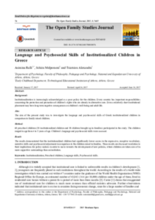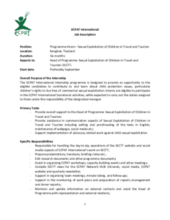Displaying 2421 - 2430 of 4424
Tens of thousands of children referred to England's social services due to abuse or neglect are falling through the cracks because they do not meet the statutory criteria for help.
Amendements to the 2015 Australian Border Force Act, which previously threatened immigration detention centre workers with two years in prison if they spoke out about neglect or abuse, have been introduced.
A pilot project is running five investigations of child sexual abuse in Bali, including two investigations at orphanages where staff are believed to be sexually abusing the children in their care.
This study investigated the language and psychosocial skills of pre-school aged Greek institutionalized children in comparison to Greek children of the same age raised in a family environment.
The Jammu and Kashmir High Court called on government to create an action plan to address the deficiencies in the state's orphanage homes.
All over the world, children are placed in orphanages because their families do not have the resources to care for them. In this short film, a mother makes the difficult decision to leave her daughter to the care of an orphanage.
Catholic Relief Services has released a video portraying a mother's inner struggle while making the decision to leave her child to the care of an orphanage, promoting their joint project Changing the Way We Care and calling on viewers to rethink their support for orphanages.
ECPAT International is seeking a Programme Intern to support its Sexual Exploitation of Children in Travel and Tourism programme.
This study examined the way adoption of children from out-of-home care is understood by the professionals involved in making decisions about their permanent care placements in Victoria, Australia.
A Canadian study found that 3 in 5 homeless youth had experience with the child welfare system, a rate 193 times higher than the general public.


